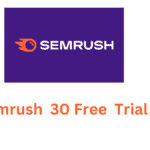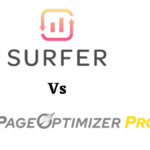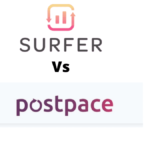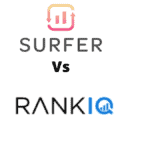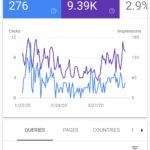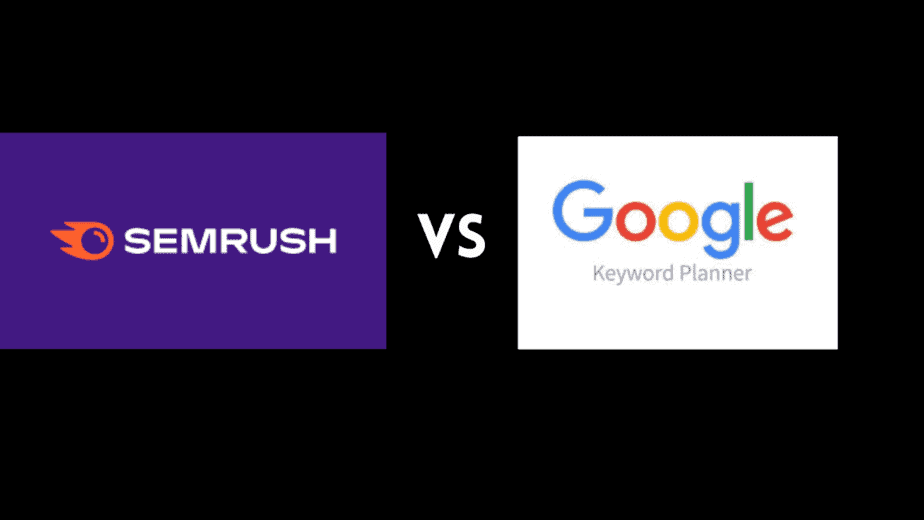
As a blogger, I have used Semrush and Google Keyword Planner for keyword research and other SEO tasks.
In this Semrush vs Google Keyword Planner guide, I will compare both SEO tools based on key SEO tasks that matter.
I will share my experience with you and also make recommendations based on which is better.
My Recommendation – Semrush
Semrush is far better than Google Keyword Planner. In terms of keyword research, Semrush tells you the monthly search volume, the keyword difficulty score, search intent, cost per click, competitive density, and SERPs feature of any keyword. These are key reports you need to decide if you can rank or bid for such keywords. Google Keyword Planner only tells you the estimated search volume of keywords and the amount advertisers bid for them.
Apart from keyword research, Semrush has features for domain analytics, site audit, on-page SEO Checker, social media management, link building, content strategy, digital advertising, etc. These are what Google Keyword Planner lack.
A lot of people worry about Semrush pricing.
That shouldn’t be a barrier. I have a strategy that works!
Leverage the free trial Semrush Pro or Semrush Guru offers, do your keyword research, and come up with a list of keywords you will write for at least one year.
Export them to a spreadsheet like Excel. Cancel the free trial before the 30-day duration. That way, the credit card you entered won’t be charged. Easy-peasy!
Start your Semrush 30-day trial, and cancel anytime
Highlights of Semrush vs Google Keyword Planner
- Semrush is one of the most advanced and complete SEO tools that do more than keyword research. Google Keyword Planner is only good for keyword research.
- Semrush has a top-notch keyword research tool that provides all the details you need about a keyword. Google Keyword Planner gives a report on the estimated search volume of a keyword, competition level, and the amount advertisers bid for it.
- Semrush is meant for SEOs that want to scale their organic traffic and overall SEO of their site. Digital marketers and advertisers can also use it to identify lucrative keywords they can bid. Google Keyword Planner is meant for Google Advertisers that want to gain insight into keywords their competitors target.
- Semrush has features you can use for domain analytics, site auditing, technical SEO, positioning tracking, link building, on-page optimization, content marketing, etc. Google Keyword has none of these features.
- Semrush and Google Keyword Planner have keyword search tools that are easy to use.
- Semrush has a free plan and three paid plans with a 30-day free trial which you can cancel anytime. Google Keyword Planner is free but requires setting up an account properly.
Who Needs Semrush?
You need Semrush if:
- You want to do competitive keyword research and uncover all the reports about a particular keyword
- You manage multiple SEO projects
- You want to track multiple keywords
- You want to audit your site
- You want to analyze your domain and that of your competitor
- You want to gain insight into the historical data of your competitor’s website
- You want to integrate Semrush into other web applications your business uses
- You want to develop a content strategy
- You want to analyze your competitor’s digital advertising strategy
Who Needs Google Keyword Planner?
You need Google Keyword Planner if:
- You want to do keyword research and get only the estimated monthly search volume of a keyword
- You want to gain insight into keywords Google advertisers bid for
Semrush Pricing
Semrush has 4 pricing plans apart from the free account which limits you to doing keyword research 10 times a day.
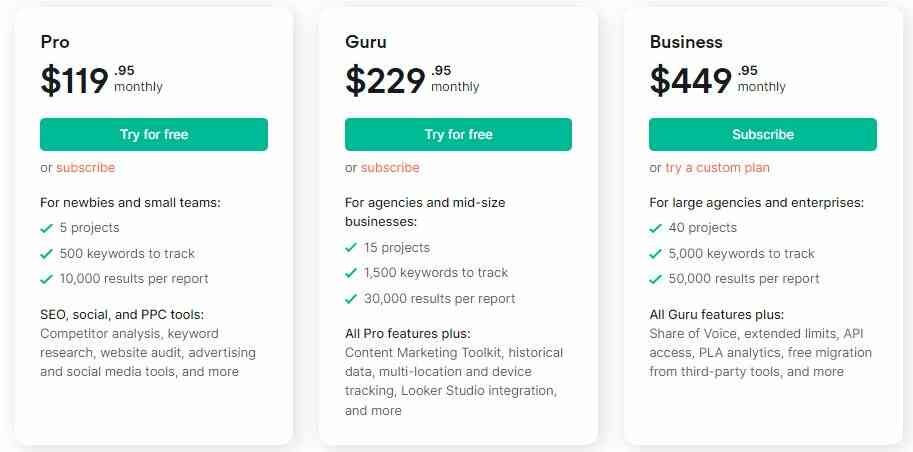
We look at them below:
Semrush Pro – $ 119.95/month ( For beginners & small businesses)
It has features for competitive keyword research, site auditing, on-page optimization, domain analytics, etc. However, there is a limit to the number of reports you can pull for each of the SEO tasks mentioned here.
Semrush Guru – $ 229.95/month ( For agencies and mid-sized businesses)
It has all features included in Semrush Pro and in addition offers advanced features like content marketing tool kit, device tracking, and Looker Studio integration.
Semrush Business – $449.95/month ( For large agencies and businesses)
Semrush Business has all the features available on Semrush Guru and in addition offers more advanced features like API access, Semrush product listing ad, share of voice, etc.
Read this article where I compared Semrush Pro, Guru, and Business Plans in detail.
Semrush Custom Plan – Contact Sales ( For large teams and businesses that want customized features)
If other pricing plans of Semrush don’t meet your requirements, then you need the Semrush Custom Plan. On this plan, you discuss with the sales team and decide on features you want and Semrush will have them tailored to your business.
You get the best features some of which include:
- Bespoke customization
- Dedicated account manager
- Access to BETA features
- Premium support
Read this article where I discussed Semrush pricing in detail.
Google Keyword Planner Pricing
Interestingly, Google Keyword Planner is free and doesn’t charge a dime. All you need is a Google Ad account to use it. This is why many people use it for keyword research. However, it is no match to Semrush because the data it provides isn’t enough to decide if you can write and rank for a keyword.
Pros of Semrush
- Easy to use
- Has a free account and offers a 30-day free trial
- Offers discount for annual plans
- Advanced keyword research tool
- Has a huge database
- Broad set of SEO features to scale the SEO of multiple sites
- Powerful link-building and tech SEO features
- Generous usage allowance
Cons of Semrush
- It only gives data for Google
- Traffic report isn’t always accurate
- Pricing plans can be expensive if you’re on a low budget
Pros of Google Keyword Planner
- It’s free to use
- It’s easy to use and has no learning curve
- You can add group ideas for your business campaigns
- Shows you the amount advertisers bid for a keyword
Cons Of Google Keyword Planner
- Doesn’t provide a detailed report about a keyword
- You can’t use it for other SEO tasks apart from keyword research
Semrush and Google Keyword Planner are two well-known SEO tools but which of them gives you accurate information in terms of keyword research, and other factors that affect the SEO of your website?
In this post, I will show you how both SEO platforms compare in terms of:
Keyword Research
Semrush is a beast when it comes to keyword research. Using the Keyword Magic Tool or Keyword Overview, you get all the reports you need to validate if you can rank for such keywords.
Some of such reports are:
Intent – describe the nature of the keyword which could be informational (I), transactional (T), commercial ( C), and navigational ( N)
Volume – the number of searches a such keyword gets monthly
KD( Keyword Difficulty) – How easy or hard it would be to rank for such keywords. The lower the KD score, the easier it would be to rank for it
CPC ( Cost Per Click) – The amount Google advertisers are willing to pay to use such keywords to promote their products and services.
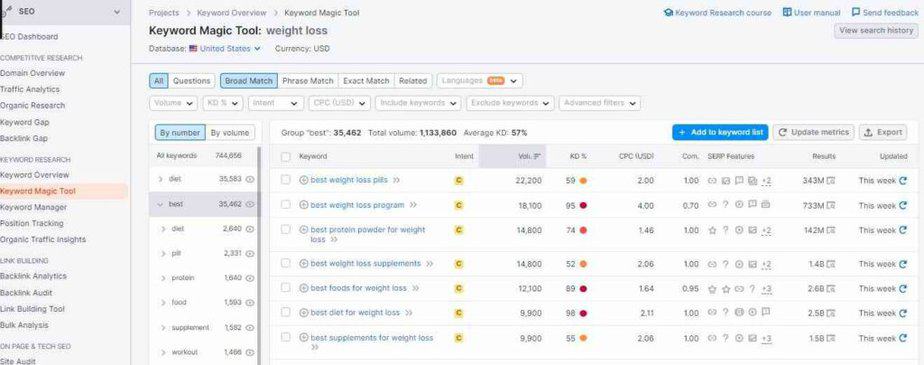
The interesting thing about Semrush is that you can refine your keyword research using broad match, phrase match, exact match, and related terms. You can use the volume, KD, intent, CPC, include keyword, exclude keyword, or advanced filters to improve your chances of identifying a lucrative keyword you can easily rank for.
The icing on the cake is that you can also add identified keywords to ‘Add To List’ so you can access them anytime or even export them to a spreadsheet.
Google Keyword Planner lacks majority of the features I discussed above about Semrush. At best, you get a range of monthly search volume of a keyword, competition level, filter and refine keywords option, create group keyword ideas, and see the amount advertisers bid for a keyword.
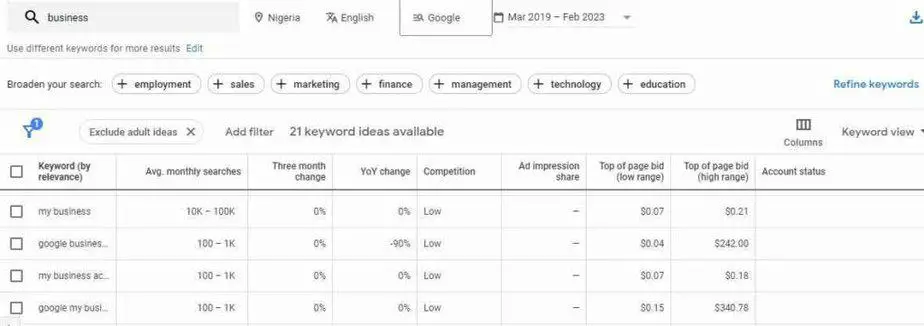
Verdict: Semrush wins
Digital Advertising
Agreed, Google Keyword Planner is a tool that helps Google advertisers identify lucrative keywords they can bid for. However, its data doesn’t cover other digital advertising platforms like Facebook, Instagram, and Twitter.
This is where Semrush comes in. Apart from Semrush PLA – Product Listing Ads which you can use to spy on your competitors that advertise on Google, the AdClarity app which is available on Semrush app center helps you uncover the digital ad strategy of your competitors.

Verdict: Semrush wins
Domain Analytics
Semrush has this feature which you use to estimate the organic search traffic and paid search traffic of your site. It’s also a way to look at the keywords your site ranks on Google and the PPC ( Paid per Click) reach compared to your competitors. Google Keyword Planner doesn’t have such features at least for Google advertisers to see how they outdo their competitors in terms of PPC.
Verdict: Semrush wins
Site Auditing
This is a task tech SEOs do to identify issues that affect the search engine visibility of your website. And Semrush has a feature to handle this. Plug into your site, and you get reports of on-site health, errors, warnings, and crawlability. Semrush even makes recommendations on how to fix issues with your site. Unfortunately, Google Keyword Planner doesn’t have this feature.
Verdict: Semrush wins
Broken Link Analysis
Using Semrush, you can analyze Broken links on your site and fix them. This helps to provide the best user experience for your target audience and boosts the overall SEO performance of your site.
Users feel disappointed when they click on a link only for it to return a 404 error or any other type of error message that shows that the page doesn’t exist again. Use the site audit tool and the backlink audit tool on your dashboard to identify internal and external broken links on your site and fix them.
Google Keyword Planner doesn’t have a feature that analyzes Broken links on your site.
Verdict: Semrush wins
Backlink Analysis
Backlinks boost your domain score and also help you rank for competitive keywords in your industry. Semrush has a tool – backlink analysis which you can use to identify sites linking to you, their domain score, organic traffic, the referring page, the nature of links, etc. Interestingly, it also shows you bad links you have acquired which can hurt your site if you don’t disavow them immediately.

Google Keyword Planner doesn’t have this feature.
Verdict: Semrush wins
Ease Of Use
In terms of conducting keyword research, Semrush is easy to use. The same is true of Google Keyword Planner. Just enter the keyword you want to get a report about and within a few minutes both tools generate reports about them.
However, Semrush has a learning curve if you want to carry out advanced SEO tasks like position tracking, creating and managing SEO projects, device tracking, and historical data. You must be an SEO with years of experience to use these features immediately. A beginner will likely take some courses on Semrush Academy to understand how to use these features.
Verdict: Google Keyword Planner wins
Pricing Plans
Semrush has 3 pricing plans that range from $119.95 – $449.95. This could be expensive for a beginner on a low budget but trust me the features are worth it and are the best you can get in any top SEO tool. Even if you are a beginner, instead of using the Semrush free account which has many limitations, you can leverage Semrush 30-day free trial.
As I stated earlier, you can do your keyword research to identify keywords you can write for at least one year, carry out other SEO tasks and then cancel the free trial before it expires. That way Semrush won’t charge the credit card you entered, and you’d have derived maximum value from it.
Google Keyword Planner is free.
Verdict: Google Keyword Planner wins
Support
Google Keyword Planner is free, so you don’t expect premium support. You only get premium support if you run ads on Google. Then through a dedicated ad manager, you get support as a customer.
Semrush offers premium support for all its paid plans except Semrush free account where you are expected to read knowledge-based articles to resolve issues you face.
Verdict: No winner
You have to be a paying customer to enjoy premium support.
Final thought on Semrush vs Google Keyword Planner
Semrush is a complete SEO tool that you can use beyond keyword research. It has all features you need to scale your SEO as a business and enterprise. This gives it a strong edge over Google Keyword Planner which you can use only for keyword research and to gain insight into the amount advertisers bid for a keyword.
And to set the facts straight, Semrush is meant for SEOs and digital marketers while Google Keyword Planner is meant for Google Advertisers. But some SEOs tend to use it for keyword research since the same keywords advertisers target also rank on Google.
If I’m to suggest, Semrush is more advanced when it comes to keyword research since it provides detailed reports about a keyword than Google Keyword Planner.
Use the 30-day free trial of the paid plans to conduct your keyword research. Identify keywords you can write for in a year, export to your spreadsheet, and save. Use it to carry out other SEO tasks to put your site on the right path for search engine visibility. Then cancel your free trial before it expires to stop Semrush from charging your credit card.

